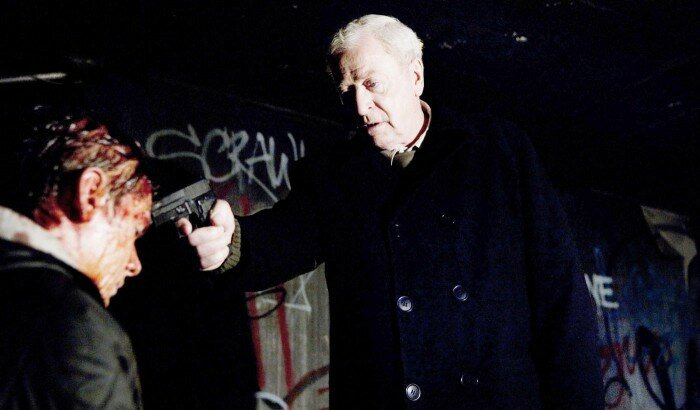Imagine if Gran Torino’s Walt Kowalski (Clint Eastwood) was the disgruntled pensioner living next door to the characters of Trainspotting, scornfully yelling “get off my estate!” to the local gangs and drug addicts. That’s essentially Harry Brown in a nutshell. Sounds like a bit of a laugh doesn’t it?
Well it’s not. Harry Brown is a bleak and brutal revenge drama/thriller that hasn’t a funny bone in its body. That in itself isn’t necessarily a bad quality given that there’s nothing particularly amusing about gangland violence or drug addiction, especially in the grisly South suburbs of London where Harry Brown is set. Yet the problem I have with the film is the sensationalist extremes director Daniel Barber, in his feature debut, deems necessary to make his morally-ambiguous point, one that tends to reward violence as much as it pretends to denounce it.
Shot from the perspective of a gang member’s mobile phone, the film’s opening scene reveals just how wickedly sadistic these misguided youths are as they senselessly shoot an innocent mother dead while out on a joyride. Harry Brown (Michael Caine), a retired war veteran and resident in a nearby council estate, wakes up to the news of the murder, disgusted at how frequently gang-related crimes are occurring in his South London suburb. Days after losing his hospitalised wife to illness, Harry’s best friend Leonard (David Bradley) is stabbed to death while walking home by a gang of youths — namely Noel Winters (Ben Drew), the son of an imprisoned crime boss who has taken the reigns in his father’s absence. With nothing left to lose, Harry takes it upon himself to clean up his neighbourhood, fed up with the ineptness of detectives Alice Frampton (a horribly miscast Emily Mortimer, looking constantly forlorn for inexplicable reasons), Terry Hicock (Charlie Creed-Miles) and the entire police department in bringing the criminals to justice.
There are numerous critics who have praised Harry Brown for being gritty and uncompromising social realism, but I’m not at all convinced. Don’t get me wrong; cocaine addiction, drug trafficking, sexual abuse and juvenile crime are very real issues. Believing otherwise would be naïve. What’s not so realistic, however, is the way Gary Young’s screenplay takes these social issues — plus a multitude more — and jams them into 103 unevenly paced minutes. The result is so relentless in its attempt to shock the audience into submission that it transcends reality and crosses into the realms of hyper-realism. The moment Barber resorts to over-the-top violence as a means to an end — completely at odds with any message suggesting crime doesn’t pay — Harry Brown becomes an unintentional farce, devoid of any of the humour and joy that usually comes with the territory. When you consider the basic premise sees an 80 year-old pensioner become a gun-toting vigilante, it’s a wonder why the filmmakers went down such a dark and solemn road to begin with.
There’s no denying Sir Michael Caine’s skill as an actor, bringing his absolute best to a role that demands nothing less. His graceful yet commanding presence on screen makes him instantly likable, an imperative quality in keeping us on his side the moment his actions become less righteous and more cold-blooded. That said, it’s hard not to support his vengeful ways when the youths he’s out to kill are as hatefully characterised by blatant stereotypes as they are here. There isn’t a single redeeming quality to any of their characters, each so depraved of humanity that we’re told, and given no other choice but to accept, that they commit murder purely for entertainment. Perhaps that’s true, but what the film fails to point out is that these youths are themselves victims to a largely inadequate system, having likely being raised in abusive families and receiving next to no schooling. Without at all reasoning their behaviour to the audience, instead choosing to write them off as the devil’s incarnate just so that their bloody demises are justifiable and gratifying, Harry Brown is nothing more than an ill-conceived Punisher sequel masquerading in a fancy overcoat.
Update (17/5/2010):
It has been three weeks since I saw Harry Brown at a media screening and wrote this admittedly harsh review, yet to this day, the film is still passionately discussed amongst my peers at screenings. Whether it be good or bad, it cannot be denied that this film gets a strong reaction out of its audience, which is more than can be said about most films. While I clearly have my reservations about the film, particularly its moral stance, I think Harry Brown is worth seeing if you’re one to talk passionately about film and the issues they raise.
 Follow the author Anders Wotzke on Twitter.
Follow the author Anders Wotzke on Twitter.















